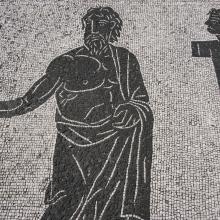Charismatic leaders such as Jean Vanier can inspire and transform us. But when these leaders commit abuse, how do the movements they ignite pick up the pieces?
teaching
My son wanted a simple answer, and I could not give him one. It is similar to our overall climate today — we want simple answers to our questions, but that’s not always possible, is it? Humanity is not always simple. But it is necessary that we see the reality we face for and with our children. The things we teach them today, the way we talk about the world, the church, the political climate — it affects them and shapes their futures.

Image via Lawrence OP / flickr.com
Would St. Justin Martyr recognize us as Christians? After reading his, “Discourse to the Greeks,” I have my reservations. I doubt he would recognize me.

Photo via Comedy Central / Youtube
The Comedy Central duo has long been using comedy to challenge injustice. Now they’re tackling education.
The new skit portrays Keegan-Michael Key and Jordan Peele as primetime anchors of “TeachingCenter,” a show meant to mimic ESPN’s flagship athletic program, SportsCenter. The two hosts obsess over new teaching trades, a live draft for teachers, and an in-depth analysis of pedagogical technique. We even get a glimpse at a BMW commercial starring an educator.
The French composer Claude Debussy once said, "Music is the space between the notes." His compositions were a part of Impressionism in music, a movement in the late 19th and early 20th centuries that focused on suggestion and atmosphere and favored short forms of music like nocturnes, arabesques, and preludes. This movement was a correction of the excesses of the Romantic period, where the focus was on strong emotion and the depiction of stories and the favor was toward long forms of music like symphonies and concertos.
I created my SOLE space by providing one desktop computer per four students, a whiteboard to write questions on, and paper and pens for students to take notes for their sharing at the end of SOLE.
Then I asked a big question — “Why does a blue whale have such an enormous heart?” — and I let the adventure begin. My students began their investigations.
After 40 minutes, they shared their discoveries.
“Blue whales swim all over the world,” said Ki’ara, “So they need a gargantuan heart to be their motor.”
“Blue whales can call to each other over almost a thousand miles,” said Heavenly. “They need a big heart to talk to each other.”
“They swim together in pairs,” said Amare, “So they need huge hearts to care for each other.”
“Yeah,” said Isaac, “That’s true … it takes a huge heart to care for somebody.”
“Kids who are nice to me on the playground must have a big heart like a blue whale,” added Aydan. “And people who are mean must have small hearts.”
“Hmmm,” I said. “How can we have big hearts for each other instead of small hearts?”
As people of faith, we sometimes don’t take time to prepare ourselves for what is ahead. With so many things vying for our time and attention, it is difficult to educate ourselves about all facets of critical matters. Even in our relationship with God, we gloss over important details that will guide us into a closer walk and become content with a distant half-hearted relationship. However, a casual walk with God is not one we should settle for. By delving into God’s Word, we are able to draw upon God’s wisdom for guidance and find a deeper relationship with God as we travel through this journey of life.
In a similar fashion, we cannot settle for casual knowledge of the Affordable Care Act, which is now upon us and “gives Americans unprecedented information about the health plan choices in their own communities.” The Kaiser Family Foundation reports in a recent poll that 51 percent of all Americans are still unsure about how the ACA will affect them. 42 percent of Americans thought that Congress had overturned the act or that the Supreme Court had ruled it unconstitutional. And, many Americans worry that they will have to shell out more money due to the new health reform law. This uneasiness and misinformation certainly warrants a closer look as we journey through the multiple avenues of the Affordable Care Act.
A life transition — like any effort to follow Jesus — is stressful: packing and unpacking, bidding farewells, refocusing from one set of commitments to a new future. It might be summarized in the early North African church leader’s interpretation of this Sunday’s Gospel reading from Luke 14:27: “Take up your stress and your tortures.” (Tertullian)
This September, my family’s transition from the hazy days of summer’s more casual pace back into the back-to-school rat race is tougher than usual. It not only involves our own children finding their way back onto their college campuses, but I am going too, to teach at Valparaiso University where I’ve been appointed to an endowed professorship which supports the study of Christian values in public and professional life.
Of necessity, most roads back-to-school are paved with lines of procedures, rules, and formalized rituals. The foundation of learning, however, is far less formalized or predictable — it’s more relational, like a disciple and master, protégé and mentor, choral director and chorister. Whether in musical arts, as in in Vy Higgensen’s Gospel for Teens program, or in biblical hermeneutics, the best learning happens in healthy relationships.
"We all have a story to tell."
These are the words that will greet my new elementary students as they enter my classroom this year.
I will tell them my story: who I am, what I do, when I was born, where I have lived, why I am a teacher, how I came to our school.
I will tell them this story: When I was their age, I carried a tattered journal, a Papermate pen, and a pocket dictionary everywhere I went. I wrote about the people, places, and things I saw with my eyes, heard with my ears, smelled with my nose, tasted with my tongue, and felt with my hands. I put down on paper the ideas and feelings that were floating around in my head and my heart. I was nerdy (and still am) ... but I was me!
"Will you tell me your story?" I will ask them.
The question for me as a teacher is not so much "What could have been?" as it is "What can be?"
I think of my fourth grader holding signs that say, "I am MLK," "I am Anne Frank," "I am Harvey Milk," "I am Daniel Pearl," "I am James Byrd, Jr.," "I am Matthew Shephard," and "I am Yitzhak Rabin." Though she cannot really be them, she certainly can take up their work and carry it on in her own life. She wants to become a doctor so she can help people live. With that spirit, she will help these martyrs live, too.
As a teacher, it is my job not only to help students imagine a world without hate, but also to help them find the tools and the heart to build it.
The announcement was broadcast at the end of the day over the school’s public address system.
"Our Teacher of the Year for 2013-2014 is ... Mr. Barton. Congratulations!"
I walked out into the third-grade hallway where students were lined up for dismissal. Little hands reached up and patted me on the shoulder. Small voices joined together and called out, "We're proud of you, Mr. Barton!" Alondra, a quiet student, pulled me close and said, "Thank you for being my reading teacher." I was honored and humbled.
As I walked back into my classroom, I reflected over my five years teaching at this Title I elementary school. "Who am I, what have I done, to become Teacher of the Year?" I asked myself.
We were walking up the beach, on the sand as the tide moved out toward the ocean. I was holding Zeke's hand, talking with him about sea things. "I didn't know jellyfish swam this close to the shore during the spring," he said in 5-year-old wonderment. "I bet that drift wood is as old as The Old Man and the Sea. I think a horseshoe crab's blood can be used to treat cancer."
"Look," I said.
"What is it, Dad?" he asked.
I picked up a shell out of the deep, hot sand and held it in my open hand.
During my first year as a second-grade teacher, I struggled with classroom management. I am a soft-spoken person by nature and habit. I didn't have the experience to help me set up great rules and procedures for my students. My classroom was noisy and chaotic. I think you could hear us all around the school.
A well-meaning colleague stopped me one day after school and offered, "Trevor, you need to find your teacher voice. Most of the children at our school won't listen to you unless you yell at them. You need to show them who's boss."
After five years of teaching, I agree that it is important to find your teacher voice. I disagree, however, that your teacher voice needs to be mean and bossy. I found my voice. It’s nurturing and supportive and one that students can internalize for positive growth and change.
I thought about this teacher voice when I met 7-year-old Maria. On her first day in reading intervention classroom, she made a mistake on a skill sheet. She asked for an eraser but I said, "Don't worry if you make a mistake. You don't have to erase it. Just cross it out and fix it. I'll never be angry with you if you make a mistake. I just want you to try to fix it."
Dear God,
As my son Zeke says in his daily prayers, so I say in our prayer this morning, "Thank you for all of the good things in the world."
One of those good things happened to me when I stopped by the water company to pay my bill. I walked into the building and stopped at the receptionist's desk to borrow a pen to write the check. I heard a family behind me and turned a saw a small child leading her mother by the hand, a mother carrying a baby in the cradle of her arm. The child listened to her Mother speak to her in Spanish, then looked at the receptionist and asked in English, "Can you show us where to pay our bill."
Suddenly and surprisingly the child looked up at me and threw her arms around me in a happy hug. "Mr. Barton!" she said. "I'm glad to see you, Mr. Barton!"
Bralyan loves bugs.
I met him during the first week of school as I conducted the standard assessment of how many words he could read per minute from a second-grade story. After the assessment, I gave him the customary caterpillar sticker to put on his shirt to show everyone that he was going to emerge as a great reader during his second-grade year.
You would have thought that I had given him a piece of gold.
"Oooh, I love bugs," he marveled as I handed him the sticker. "I have seen caterpillars around the trees at my apartment. They spin a chrysalis and turn into butterflies.
“Have you seen a roly poly bug?,” he continued. “They're my favorites!"
And so a friendship began around the pyrrharctia isabella, the armadillidum vulgar and other bugs that make up the most diverse group of animals on the planet.
This interaction told me some crucial things about Bralyan. It told me he is a smart kid, and it also told me that keeping him engaged in school would likely include bugs.
I later learned that Bralyan and his family moved here from Mexico when he was a baby. His mom and dad speak only Spanish at home. He speaks English at school.
"We the people, in order to form a more perfect union ..."
I heard these words for the first time in a song when I was a kid. I was pouring a glass of orange juice in the kitchen when I heard it. Bugs Bunny had ended. I was waiting for Fat Albert and the Cosby Kids to begin. There was the familiar refrain of Schoolhouse Rock in between those cartoons.
"As your body grows bigger, your mind grows flowered, it's great to learn 'cause knowledge is power!" And there it was—the Preamble to the U.S. Constitution in song. I learned it and never forgot it.
When I became an elementary school teacher, one of my goals was to teach my students to sing the Preamble.
Being a teacher is like being a farmer. You rise early in the morning. You irrigate and fertilize the field that is your classroom. You plant the seeds that are reading, writing, and arithmetic. You hope for good soil, warm sunshine, and gentle rain that are good homes, healthy foods, and adequate healthcare for your students. You work with your hands, feet and heart with your plants who are your students.
Your harvest is your students.
Your winter season of fallow fields is your summer break of empty classrooms.
I try to teach in the present. With Billy, though, I found myself thinking about the future. Will middle school be a challenge for him? Will he be an outcast in high school? Or a target for bullies?
I wondered what contributions he might make to society as an adult. Would he start a revolution in the art world?
If his peers constantly slap their hands down and say there's no room for him, how will he react? Will he become a part of what author Alexandra Robbins calls the "cafeteria fringe,” those people who are not a part of the school's or society's in-crowd? Because he seems different, will he be labeled “geek,” “nerd” or “weirdo?”
As a teacher I want to help him overcome. But what can I do?
Nikki Haley, the governor of my state, recently signed the South Carolina Illegal Immigration and Reform Act. The law, which is part of a recent wave of state immigration legislation, goes into effect in January. As she signed the bill, she stated:
“What I’m concerned about is the money we’re losing because of illegal immigration in this state. The money that’s lost in education and medical services and workers and employment and all of those things is well beyond millions of dollars …”
It is dehumanizing when you refer to people only in terms of money. Further, the research does not support the governor’s statement.
According to the Institute for Taxation and Economic Policy, undocumented workers in South Carolina paid $43.6 million in state and local taxes in 2010. Another study outlined the losses to the state if all unauthorized immigrants were removed from South Carolina. The state would lose $1.8 billion in economic activity, $782.9 million in gross state product and approximately 12,059 jobs.
There is a wonderful scene in Harper Lee's novel To Kill A Mockingbird where the all-white jury has returned an unjust verdict against Tom Robinson. Atticus Finch begins to wearily walk out of the courthouse. His children, Jem and Scout, are in the balcony with the black folks of the county. They all rise as Atticus walks out — except the children — so the Rev. Sykes says to Scout, “Miss Jean Louise, stand up. Your father’s passin’.”
During the first weeks of school, Scout's story came back to me as I was benchmarking the reading levels of our first- and second-grade students. Before I took the students through the benchmark test, I asked them open-ended questions and listened to their answers. At first they were shy, as children often are when they meet a new teacher. But soon they were telling me their stories with confident voices and dimpled smiles.

















